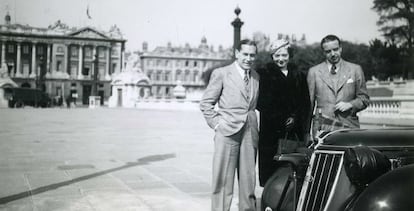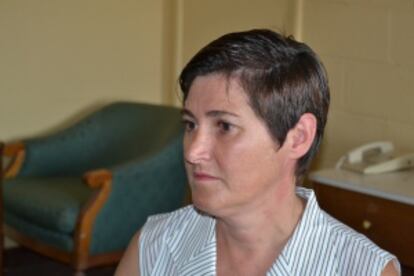The man who hunted down Spain’s Republican exiles
Loreto Urraca has uncovered the dark history of her grandfather, who spied for the Franco regime

Loreto Urraca Luque didn’t meet her grandfather until she was 18, having been brought up by her mother, who told her that he was a diplomat. Three years later he died. Of the little time she spent with him, her only memory is his insistence that she write his memoirs. Instead, she got on with her life, eventually moving to the United States.
But one day, in 2008, she read an article in EL PAÍS entitled El cazador de rojos (or, The red hunter), about Pedro Urraca Rendueles, the man responsible for handing over to the Gestapo Lluís Companys, the head of the Catalan regional government from 1933 to 1939, when, at the end of the Spanish Civil War, he was exiled to France. Her grandfather had worked for the Franco regime, and with France’s capitulation, had then lent his services to the Gestapo. After the end of the Second World War, he continued working for the military regime in Spain, finally retiring in 1982. The article renewed Urraca’s interest in her grandfather, and she began looking into his activities, which mainly consisted of spying on Spanish Republican exiles.
Her grandfather worked for the Franco regime, and with France’s capitulation, had lent his services to the Gestapo
“It was 20 years after his death, and my grandfather was the least of my concerns,” writes Urraca from her home in the United States. “My life was focused on my family, my work; the usual things. But when I read the article I felt like a bull in the ring – confused and not knowing what was going to happen. But I also felt that I was open to being shamed, to people despising me, and that my privacy had been violated – I would have preferred the story not to have come out. My surname is not a common one, and I was aware that I could be linked to him, which is exactly what happened.”
Two years later, journalist Gemma Aguilera, who had written a book about Pedro Urraca Rendueles and his role in the arrest of Companys, got in touch. “She had carried out a quick search on the internet and discovered who I was,” Urraca explains. “She was writing a piece on the occasion of the 70th anniversary of Companys’ execution. She asked me what my impressions of him were from when I was a child and he rocked me on his knee. The innocence of the question disconcerted me. How could anybody believe that this man had influenced the way I was brought up, or that I could be in any way shaped by his political views? That was what made me decide to look into his past.”

Pedro Urraca was a police officer who worked in France and Belgium for the Franco regime right up to the early 1980s, when Spain was still moving from dictatorship to democracy. In 2006, a doctoral thesis provided conclusive proof that he was the man who handed Lluis Companys over to the Gestapo. He then jointly interrogated him with the help of the Germans, took him to the Spanish border with France and handed him over, where he was subsequently shot. Urraca also helped capture other Republicans living in France, such as Julián Zugazagoitia and Francisco Cruz Salido, the Republican government’s former interior minister and defense secretary, respectively, and who were both later shot. Urraca set up a network that allowed him to monitor the movements of hundreds of exiles, as well as tracking down their assets in Spain, which were then confiscated.
His niece has spent years trawling through French and Spanish archives to trace her grandfather’s career. She set up a website where she listed the names of the 800 Spaniards whose names appeared on 268 reports he sent to the authorities in Franco’s Spain. Loreto provided new information about her grandfather. “Something really important that was unknown until now was that my grandfather also helped the Germans to capture Jean Moulin, the French Resistance leader. This is the conclusion that I have reached from reading documents in different locations, and that could be the basis for further research.”
Pedro Urraca also helped the Germans to track down and arrest several notable Jews; for example, the painter Antoinette Sachs. After France was liberated, he was found guilty in absentia for collaborating with the Nazis and sentenced to death. He fled France and started a new life in Belgium with a new name, and continued working for the Franco regime with diplomatic accreditation, but Loreto Urraca has been unable so far to find much out about this later period in his life. She is calling on Spanish historians to take advantage of the availability of the Foreign Ministry’s files now that 25 years have passed since her grandfather’s death, and to find out more about him.
I felt that I was open to being shamed, and that my privacy had been violated” Loreto Urraca Luque
From police files and the material gathered by his niece, it seems that Pedro Urraca continued to work for the Spanish state until at least 1982. Interior Ministry files show that he was promoted to the rank of commissioner without having to take any exams or be interviewed, and that he was awarded some of Spain’s highest medals. After retiring from the police he continued working for the Foreign Ministry in what seems to have been a post created specially for him to keep an eye on Spanish immigrants. He was granted two different pensions, and returned to Spain in 1986, where he died in September 1989.
Loreto Urraca still remembers her first meeting with her grandfather. “On my 18th birthday, my father called me from France. He suggested that we meet, and said that he wanted me to meet his parents. It was difficult for me, but I accepted. The meeting was very tense. My first reaction to my grandparents was one of disgust. He was blind, and she could hardly see. They both kept touching me, and I would flinch, my skin covered in goose bumps.” She also learned that her grandmother had broken up her parents’ relationship: “She was a bad person, she didn’t care about anybody else except herself. She did everything possible to destroy my parents’ marriage, and she succeeded in the end. She was manipulative, and took advantage of her husband’s position to achieve her own ends.”
After six years of research into her grandfather that has taken over her life, Loreta Urraca says she is relieved to be handing over the baton to the historians. “It was a terrible experience, being exposed to those documents and the terrible truths they revealed.”
Tu suscripción se está usando en otro dispositivo
¿Quieres añadir otro usuario a tu suscripción?
Si continúas leyendo en este dispositivo, no se podrá leer en el otro.
FlechaTu suscripción se está usando en otro dispositivo y solo puedes acceder a EL PAÍS desde un dispositivo a la vez.
Si quieres compartir tu cuenta, cambia tu suscripción a la modalidad Premium, así podrás añadir otro usuario. Cada uno accederá con su propia cuenta de email, lo que os permitirá personalizar vuestra experiencia en EL PAÍS.
¿Tienes una suscripción de empresa? Accede aquí para contratar más cuentas.
En el caso de no saber quién está usando tu cuenta, te recomendamos cambiar tu contraseña aquí.
Si decides continuar compartiendo tu cuenta, este mensaje se mostrará en tu dispositivo y en el de la otra persona que está usando tu cuenta de forma indefinida, afectando a tu experiencia de lectura. Puedes consultar aquí los términos y condiciones de la suscripción digital.









































